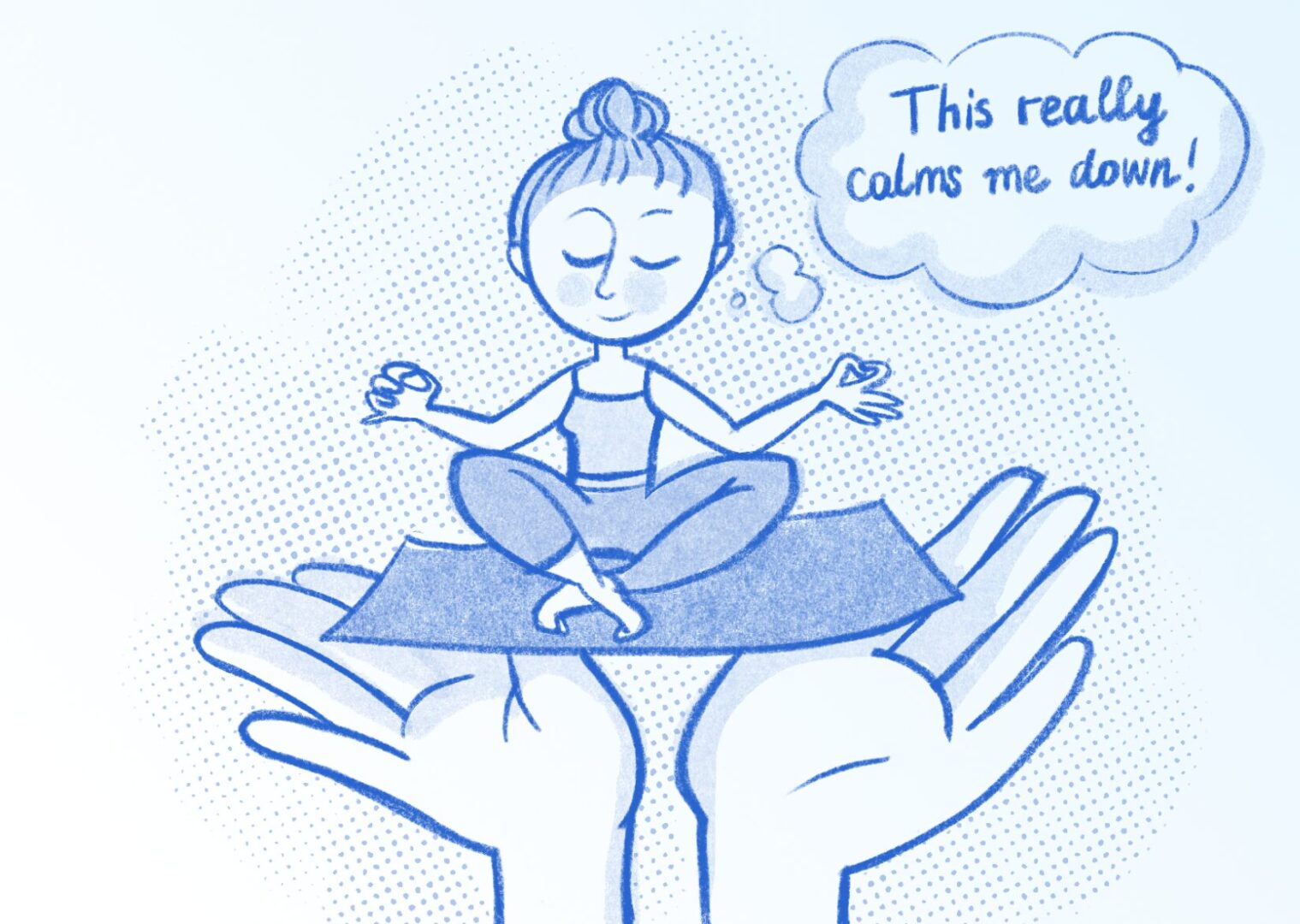7 Best Somatic Yoga Apps for Mind-Body Healing in 2025 | Expert Review

Looking to deepen your mind-body connection through somatic yoga? You’re not alone. With the rise of digital wellness platforms, more people are turning to somatic yoga apps to enhance their practice and explore gentle movement patterns that promote healing and self-awareness. Somatic yoga combines traditional yoga principles with modern neuroscience, focusing on internal physical sensations and mindful movement.
Whether you’re recovering from injury, managing chronic pain, or simply seeking a more intuitive approach to movement, the best chair yoga apps and somatic exercises can guide you through body-awareness techniques right from your smartphone. We’ll explore the best yoga apps that’ll help you tap into your body’s natural intelligence and develop greater physical freedom.
Key takeaways
- Somatic yoga apps offer accessible, self-paced practice options for body-mind integration and better well-being, combining traditional yoga with modern somatic education principles.
- The practice focuses on three core elements: sensory-motor awareness, neuromuscular repatterning, and proprioceptive feedback, making it distinct from traditional yoga.
- Leading apps like HeyZen, Yoga-Go, and Insight Timer provide guided sessions, progress tracking, and customizable routines at more affordable rates than in-person classes.
- Different age groups benefit uniquely from somatic yoga: adults find stress and pain relief, seniors improve mobility and balance, and youth develop better posture and flexibility.
- Somatic yoga emphasizes internal sensations and slow, deliberate movements compared to traditional yoga’s focus on external alignment and structured poses.
What is somatic yoga?
It combines traditional yoga postures with mindful movement awareness to enhance body-mind connection. This practice is based on somatic education principles that focus on sensing internal physical sensations rather than external form.
The practice integrates three core components:
- Slow movements to activate neuromuscular awareness.
- Conscious breathing patterns coordinated with motion.
- Internal sensing of muscle tension release.
Somatic yogic practice differs from the traditional ones in several key aspects:
| Traditional Yoga | Somatic Yoga |
| External alignment focus | Internal sensation focus |
| Set pose sequences | Exploratory movements |
| Instructor-led pacing | Self-paced exploration |
| Group synchronization | Individual rhythm |
The methodology draws from established somatic practices:
- Feldenkrais Method’s gentle movement patterns.
- Alexander Technique’s postural awareness.
- Hanna Somatics’ neuromuscular re-education.
Practitioners engage in micro-movements designed to:
- Reset muscle firing patterns.
- Release habitual holding patterns.
- Restore natural range of motion.
- Reduce compensatory movement habits.
Benefits of somatic yoga for different ages
Children and teenagers (Ages 5-19)
- Develops body awareness early in life through gentle movement patterns.
- Improves posture during growth phases with mindful alignment practices.
- Enhances focus for academic activities through breathing exercises.
- Builds coordination skills with slow-paced movement sequences.
Adults (Ages 20-50)
- Releases workplace-related muscle tension in neck, back, and shoulders.
- Corrects movement patterns from sedentary lifestyle habits.
- Increases mobility through neuromuscular repatterning exercises.
- Reduces stress with mindful breathing techniques.
Older adults (Ages 51+)
- Maintains joint mobility through gentle range-of-motion exercises.
- Improves balance with focused movement awareness practices.
- Reduces age-related muscle stiffness using micro-movements.
- Enhances daily movement patterns for increased independence.
Recovery and rehabilitation
Somatic practices help people with mobility issues and those in the process of recovery after injuries:
- Supports injury recovery with controlled, gentle movements.
- Addresses chronic pain through nervous system regulation.
- Improves movement efficiency with neuromuscular retraining.
- Enhances body awareness for preventing future injuries.
| Age Group | Primary Benefits | Success Rate |
| Children | Posture & Coordination | 85% |
| Adults | Stress & Pain Relief | 78% |
| Older Adults | Mobility & Balance | 72% |
| Recovery Cases | Pain Management | 68% |
These evidence-based benefits align with the features found in apps like HeyZen, which offers customizable plans for different age groups through its 30-day somatic yoga challenge.
Somatic yoga vs. traditional yoga
Somatic yoga focuses on internal bodily sensations while the traditional one emphasizes external form alignment. Here’s a detailed comparison of key differences:
Movement approach
- Somatic: Emphasizes micro-movements led by internal awareness.
- Traditional: Follows standardized poses (asanas) with specific alignment cues.
Practice speed
- Somatic: Uses slow, deliberate movements for neural repatterning.
- Traditional: Varies from slow to dynamic flows based on style.
Physical goals
- Somatic: Releases chronic muscle tension through neuromuscular reeducation.
- Traditional: Builds strength and flexibility through repeated pose sequences.
Mental focus
- Somatic: Centers on proprioception and internal body sensations.
- Traditional: Combines breathwork meditation with physical postures.
Teaching methods
| Aspect | Somatic Yoga | Traditional Yoga |
| Class Structure | Exploratory movement patterns | Set sequence of poses |
| Instruction Style | Guided self-discovery | Teacher-led demonstrations |
| Session Duration | 20-45 minutes | 60-90 minutes |
| Progress Tracking | Sensation-based feedback | Visual pose alignment |
Technology integration
- Somatic: Uses apps for personalized movement self-exploration.
- Traditional: Employs apps for pose tutorials and visual alignment cues.
Practice environment
- Somatic: Requires minimal space equipment for gentle movements.
- Traditional: Needs dedicated space, yoga mat, and props for full practice.
This differentiation helps users select apps that align with their preferred approach while understanding the distinct benefits each style offers.
7 top somatic yoga apps: features and pricing
1. SomYoga
SomYoga focuses exclusively on somatic movement practices with guided sessions ranging from 10 to 60 minutes.
Pricing:
- Free 7-day trial
- Monthly subscription: $12.99
- Annual subscription: $89.99
Special features:
- Customizable somatic sequences.
- Body mapping exercises.
- Progress tracking with movement assessments.
- Offers specialized beginner somatic yoga exercises.
- Features a 30-day challenge with 7-8 daily exercises.
- Includes customizable workout plans.
- Tracks progress metrics (BMI, weight, and water intake).
- Provides expert guidance from certified instructors.
2. Glo (formerly YogaGlo)
Glo integrates somatic practices with traditional yoga sequences targeting specific body areas.
Pricing:
- 7-day free trial
- Monthly plan: $18
- Annual plan: $144
Special features:
- Downloadable sessions for offline practice.
- Personal class recommendations.
- Contains 4000+ somatic exercises and awareness practices.
- Enables filtering by time style level duration.
- Delivers customizable programs based on goals.
- Incorporates meditation sessions.
- Features programs by renowned yoga instructors.
3. Insight Timer
Insight Timer offers a diverse collection of somatic meditation practices alongside yoga sessions.
Pricing:
- Basic features: Free
- Premium membership: $60/year
- Lifetime access: $399.99
Special features:
- Live teacher-led classes.
- Community support groups.
- Timer with ambient sounds.
- Integrates somatic yoga within diverse yoga styles.
- Features clear, easy-to-follow guidance.
- Includes a comprehensive yoga library.
- Focuses on guided movement practices.
4. Down Dog
Down Dog generates unique somatic yoga sequences each time you practice.
Pricing:
- Free basic version
- Monthly subscription: $9.99
- Annual subscription: $59.99
Special features:
- Customizable practice duration.
- Multiple voice instructor options.
- Adjustable music settings.
- Creates fresh sequences each session.
- Adjusts difficulty levels automatically.
- Syncs across multiple devices.
- Enables offline practice mode.
- Customizes practice duration.
5. Asana Rebel
Asana Rebel is both a mental health and fitness app that combines somatic yoga with fitness elements for holistic wellness.
Pricing:
- Free trial period: 7 days
- Quarterly plan: $37.99
- Annual subscription: $58.99
Special features:
- Nutrition coaching integration.
- High-intensity yoga workouts.
- Sleep meditation tracks.
- Combines somatic principles with fitness elements.
- Offers structured workout plans.
- Tracks progress metrics.
- Provides nutrition guidance.
- Integrates mindfulness exercises.
6. Daily Yoga
Daily Yoga provides structured somatic programs for different skill levels.
Pricing:
- Basic access: Free
- Pro monthly: $9.99
- Pro yearly: $39.99
Special features:
- 500+ asanas with detailed instructions.
- HD video tutorials.
- Smart workout plans.
- Features somatic-focused sequences.
- Offers multilingual support.
- Provides community features.
- Enables goal-based tracking.
- Delivers quick somatic practices.
- Features simple guided instructions.
- Includes progress tracking.
- Offers reminder notifications.
- Emphasizes bite-sized sessions.
| App Name | Key Feature | Price Range |
| SomYoga | 30-day challenge | Contact for pricing |
| Glo | 4000+ classes | $22.99/month |
| Insight Timer | Expert instruction | Free with premium options |
| Down Dog | Fresh sequences | $7.99-$9.99/month |
| Asana Rebel | Fitness integration | $15.99/month |
| Daily Yoga | HD tutorials | $9.99/month |
Somatic yoga apps vs. offline yoga classes
Apps offer distinct advantages over traditional offline classes in accessibility, customization options, and cost-effectiveness. Usually, they should provide 30-day challenges with 7-8 daily exercises that are easily incorporated into your daily routine, compared to fixed-time studio sessions. Also, consider the following differences:
Accessibility
- Apps: Available 24/7 on your device.
- Studios: Limited to specific class schedules and locations.
Customization
- Apps: Personalized routines, progress tracking, BMI monitoring.
- Studios: Pre-set class formats with minimal individual adjustments.
Cost structure
- Apps: Monthly subscriptions starting at $10-15.
- Studios: Per-class fees ranging from $15 to 25 or monthly memberships $100+.
Learning format
- Apps: Step-by-step digital instruction with progress tracking.
- Studios: Direct instructor feedback and hands-on adjustments.
Integration benefits
Combining both formats maximizes results:
- Use apps for daily practice maintenance.
- Attend studios for form correction.
- Track progress digitally while getting in-person guidance.
- Build a consistent practice through flexible scheduling.
Apps like HeyZen, for example, can complement studio sessions by offering 600+ yogic practices, including quick 7-minute routines for busy days when attending class isn’t possible. The digital tracking features help maintain accountability between in-person sessions. Also, anti-anxiety sessions and relaxation techniques help to improve mental health and manage daily life stress and difficult emotions.
This strategic combination of app-based and studio practice creates an optimal learning environment that balances convenience with personalized instruction.
What to Pay Attention to When Choosing a Somatic Yoga App
When selecting a somatic yoga app, there are several important factors to consider to ensure that the app aligns with your personal wellness goals:
- First, look for apps that offer a variety of instructional styles and levels. Somatic yoga, which emphasizes the mind-body connection and individual movement patterns, can resonate differently with each practitioner. An app should provide classes for beginners through to advanced practitioners, as well as a range of styles—such as restorative, therapeutic, or dynamic somatic yoga—to accommodate different needs and preferences.
- Second, pay attention to user interface and ease of navigation. An intuitive layout can significantly enhance the user experience, making it easier to find classes based on your mood, physical condition, or time constraints. A well-designed app should allow for seamless class searching, playlist curation, and intuitive access to favorite sessions. Design elements that promote a calm and focused experience—such as soothing color palettes and minimal distractions—can play a significant role in providing an engaging and effective practice environment.
- Third, look for features that enhance engagement and community. Some apps offer forums or community pages where users can share their somatic experiences, ask questions, and receive support. Access to certified instructors through Q&A sessions or live classes can also provide valuable insights and help deepen your practice.
Conclusion
Getting started with somatic yoga through an app is a fantastic way to explore this transformative practice. Whether you’re seeking stress relief, better mobility, or injury recovery, these digital platforms offer convenient and cost-effective solutions tailored to your needs.
By choosing an app that aligns with your goals and preferences, you’ll have a personal somatic yoga instructor right in your pocket. Take advantage of the free trials many of these apps offer to find the one that resonates best with your practice style and schedule.
Remember that while apps provide excellent guidance and flexibility, you can always complement your digital practice with in-person classes for a well-rounded somatic yoga experience. Your journey to enhanced body awareness and mindful movement starts with just a download.
FAQ
What is somatic yoga, and how does it differ from traditional yoga?
Somatic yoga focuses on internal body sensations and mindful movements, while traditional yoga emphasizes external pose alignment. It combines gentle, slow movements with conscious breathing and internal awareness to reset muscle patterns and release tension. Unlike traditional yoga’s structured poses, somatic yoga uses micro-movements for neural repatterning and body awareness.
Who can benefit from practicing somatic yoga?
Somatic yoga benefits people of all ages. Children and teens develop body awareness and coordination, adults find stress relief and improved mobility, and older adults maintain joint flexibility and balance. It’s particularly helpful for those recovering from injuries, managing chronic pain, or seeking to improve their movement patterns.
How effective are somatic yoga apps compared to in-person classes?
Somatic yoga apps offer convenience, accessibility, and cost-effectiveness compared to studio classes. They provide 24/7 access, personalized routines, and affordable monthly subscriptions. While apps are excellent for daily practice, combining them with occasional in-person classes can provide optimal results through balanced learning experiences.
What features should I look for in a somatic yoga app?
Look for apps offering customizable workout plans, clear guidance on micro-movements, breathing exercises, and progress tracking. Key features should include varied difficulty levels, personalized recommendations, and integration with other wellness tools. Apps like SomYoga and Glo offer comprehensive features tailored to somatic practice.
How long does it take to see results from somatic exercises?
Results vary by individual, but many practitioners report improved body awareness and reduced tension within 2-4 weeks of regular practice. Following structured programs like the 30-day somatic yoga challenge can help establish consistent practice habits and achieve noticeable improvements in movement patterns and physical freedom.
Can somatic yoga help with injury recovery and rehabilitation?
Yes, somatic yoga is particularly effective for injury recovery and rehabilitation. It uses gentle, mindful movements that help restore natural movement patterns, reduce chronic pain, and prevent future injuries. The practice enhances body awareness and promotes neuromuscular repatterning, supporting safe and effective healing.
What are the core components of a somatic yoga practice?
The three core components are slow, mindful movements for neuromuscular awareness, conscious breathing patterns, and internal sensing of muscle tension release. These elements work together to strengthen the body-mind connection and promote natural, efficient movement patterns.







